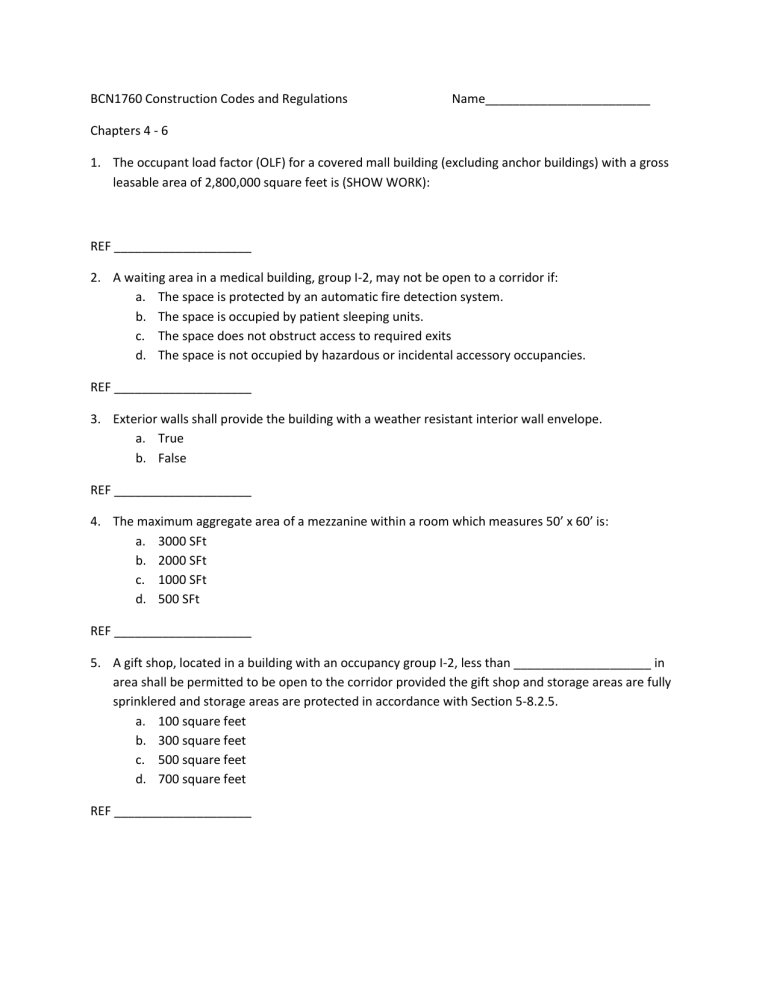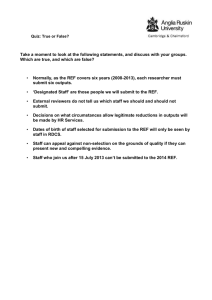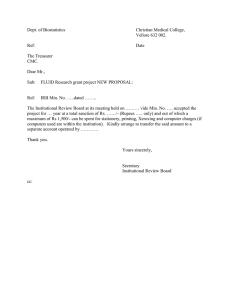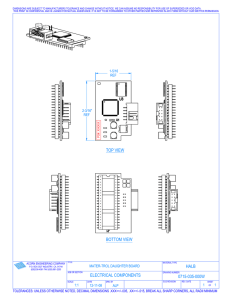
BCN1760 Construction Codes and Regulations Name________________________ Chapters 4 - 6 1. The occupant load factor (OLF) for a covered mall building (excluding anchor buildings) with a gross leasable area of 2,800,000 square feet is (SHOW WORK): REF ____________________ 2. A waiting area in a medical building, group I-2, may not be open to a corridor if: a. The space is protected by an automatic fire detection system. b. The space is occupied by patient sleeping units. c. The space does not obstruct access to required exits d. The space is not occupied by hazardous or incidental accessory occupancies. REF ____________________ 3. Exterior walls shall provide the building with a weather resistant interior wall envelope. a. True b. False REF ____________________ 4. The maximum aggregate area of a mezzanine within a room which measures 50’ x 60’ is: a. 3000 SFt b. 2000 SFt c. 1000 SFt d. 500 SFt REF ____________________ 5. A gift shop, located in a building with an occupancy group I-2, less than ____________________ in area shall be permitted to be open to the corridor provided the gift shop and storage areas are fully sprinklered and storage areas are protected in accordance with Section 5-8.2.5. a. 100 square feet b. 300 square feet c. 500 square feet d. 700 square feet REF ____________________ 6. What is the percentage area increase of a rectangular building measuring 50’ x 150’ that has 50’ of its perimeter on a public way which has a width of 30’. a. 0% b. 12.5% c. 25% d. 50% REF ____________________ 7. What is the percentage area increase of a rectangular building measuring 50’ x 150’ that has 200’ of its perimeter on a public way which has a width of 30’. a. 0% b. 12.5% c. 25% d. 50% REF ____________________ 8. The aggregate accessory occupancies within a mixed use building shall not occupy more than ____________________ of the building area. a. 5 percent b. 10 percent c. 15 percent d. 20 percent REF ____________________ 9. The primary structural frame supporting 1 roof only of Type 1 (A) construction must have a fire resistance rating of: a. 1 Hour b. 2 Hour c. 3 Hour d. 4 Hour REF ____________________ 10. The maximum travel distance within an atrium space shall not exceed ____________________ where the required means of egress is through the atrium space. a. 100 Feet b. 25 Feet c. 200 Feet d. 50 Feet REF ____________________ 11. Buildings and structures erected or to be erected, altered or extended in height or area shall be classified in one of ____________________ construction types. a. Two b. ICC’s c. Five d. The code’s REF ____________________ 12. Type ____________________ construction is that type of construction in which the structural elements, exterior walls and interiors walls are of any materials permitted by this code. a. II b. III c. IV d. V REF ____________________ 13. Only metal ducts for air distribution systems shall be permitted to be installed in Type I or Type II building because they are non-combustible. a. True b. False REF ____________________ 14. Basements are considered a story when using Table 503 or allowable building height. a. True b. False REF ____________________ 15. The minimum separation distance for an barricaded building containing 12 tons of explosive material from and inhabited building is: a. 400 feet b. 450 feet c. 1055 feet d. 2100 feet REF ____________________ 16. The licensee or registrant shall post each radiation area with a conspicuous sign or signs bearing the radiation symbol and the words ________________________________________. REF ____________________ 17. A building used for a day care is required to be a sprinklered building when the level of exit discharge is on the same floor as the day care facility. a. True b. False REF ____________________ 18. What occupancy group can be up to 4 stories and 24,000 SFt with Type II (A) construction? ____________________ REF ____________________ 19. The state requires panic switch to deactivate power to heating equipment shall be provided inside sauna and steam rooms located at educational facilities. a. True b. False REF ____________________ 20. Each crisis stabilization unit (CSU) shall have at least one seclusion room located in the CSU facility. a. True b. False REF ____________________



